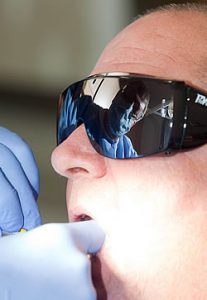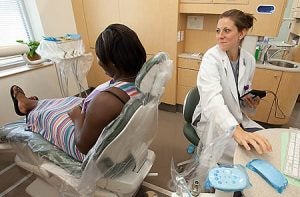First ECU dental center opens for patients
Clarence Medlin had been X-rayed. Next, a dentist would start working on his loose teeth.
“I’ve just neglected my teeth all my life,” said Medlin, a 52-year-old crane operator from Roanoke Rapids. “I don’t really know why. I’m more educated than that, but it’s one of those things.”
Medlin was one of the patients being seen Thursday at the East Carolina University School of Dental Medicine Community Service Learning Center in Ahoskie, which opened this month. He doesn’t have a regular dentist and made the 50-mile trip because he could get an appointment quickly.

Dr. Ford Grant is reflected in glasses worn by dental patient Clarence Medlin as Grant examines Medlin’s teeth Thursday, Aug. 2, at the ECU School of Dental Medicine Community Service Learning Center in Ahoskie. Photos by Cliff Hollis
The center is the first of 10 the dental school plans to build across the state. The second one is scheduled to open later this year in Elizabeth City. Sites for four others have been announced: Sylva, Spruce Pine, Lillington and Thomasville.
Dr. Gregory Chadwick, interim dean of the dental school, has said he hopes the centers will help improve the status of dental health in the state while adding an innovative educational aspect to dental school.
“We’ve taken the fourth floor of the dental school – the senior year clinical area – we’ve stretched the wires and we’re moving that part of our dental school to communities across the state where dental services are needed,” Chadwick said recently. “We are not only providing much needed care, but we are also educating our future dentists in areas similar to where we hope they will practice.”
The $3 million, 8,000-square-foot center not far from Hertford County High School is perhaps the most advanced dental clinic in the state. Its 16 chairs include a group in front of a large window where children will receive dental care. The idea is that peer pressure will help the children better cope with getting their teeth worked on, said Dr. Ford Grant, clinical associate professor of dental medicine at ECU and director of the center.
Next door, an exam room features a dental chair that can be moved on a cushion of air and replaced with a wheelchair stand that tilts its occupant back for a traditional dental care posture.
A room equipped with a special microscope helps dentists performing endodontics – root canals – better see the work they’re doing inside patients’ mouths.
Radiology equipment can take 3D images of the face and transmit them to any computer station in the clinical area.
Grant puts it succinctly. “I felt like they handed me the keys to a Ferrari,” he said. “It blew me away.”
In addition to Grant, once the center is fully staffed, it will have two dental residents, five to six dental assistants and two to three dental hygienists. Four to five fourth-year students will work at the center for nine-week rotations beginning in 2014.
Dr. Chimere Callaway is one of four advanced education in general dentistry residents now at the center – two of them will transfer to the Elizabeth City center when it opens. Callaway said she’s known of the lack of access to health care and other services in eastern North Carolina since she was a Girl Scout in Charlotte packing supplies to send east following hurricane landfalls.
As a student at Meharry Medical College School of Dentistry in Nashville, Tenn., she was taught the importance helping those in need. “This would be the perfect opportunity to fulfill my mission” of working in an underserved area, she said. She was also excited about being among the first residents in the first center. “We’re kind of like the trend-setters.” Not far from the center, 18-wheelers haul their loads around the clock. Farmers work fields of corn, cotton, soybeans and tobacco. Thousands of logs taken from nearby forests are stacked high at sawmills. Ahoskie is in the middle of a rural area where not everyone sees dental care as a priority – or can afford to make it so.
“If you’re going to get gas to get to work or groceries for your family or a crown, you’re going to get gas and groceries, unless you’re in pain,” said Grant, who joined ECU from Carolinas Medical Center in Charlotte, where he developed Carolinas Mobile Dentistry serving nursing home residents. “We have a lot of people who might take their teeth out at home.”
He wants local citizens with dental problems to know “we can treat this. We can make it healthy,” he said.
The center aims to treat patients who do not have a regular dentist. It accepts Medicaid patients and charges on a sliding scale. Grant said fees typically are about 70 percent of those at a private dental practice.
Dental school leaders also hope the center will help attract new dentists to underserved areas. North Carolina ranks 47th out of the 50 states in the number of dentists per capita, according to the Cecil G. Sheps Center for Health Services Research at the University of North Carolina at Chapel Hill. Many people without good dental care live in rural areas, where North Carolina averages three dentists for every 10,000 people. That compares to urban areas of the state, where the ratio is nearly five dentists for every 10,000 people. Nationally, the ratio is six dentists for every 10,000 people.
Three North Carolina counties, all in the northeast – Tyrrell, Hyde and Camden – have no dentists.
Grant said he could have stayed in Charlotte and been happy with his grandchildren, but he wanted to do more teaching. The center will give him that chance as students get an education in what it’s like to work in a small-town dental practice – from patient care to practice management to community relations.
“You can’t sit in a classroom and learn everything there is to learn and go out and practice,” Grant said.
ECU’s second class of 52 dental students begin their studies this month. The school’s new home, the four-story Ross Hall, is scheduled to open in September.

Patient Kamel Smallwood talks with Dr. Brooke Jordan, an ECU dental resident, during an examination at the ECU School of Dental Medicine Community Service Learning Center in Ahoskie.